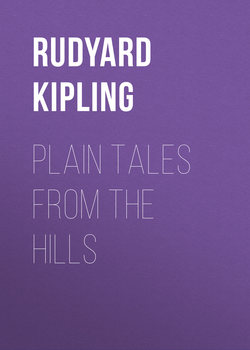Читать книгу Plain Tales from the Hills - Rudyard Kipling - Страница 9
HIS CHANCE IN LIFE
ОглавлениеThen a pile of heads be laid —
Thirty thousand heaped on high —
All to please the Kafir maid,
Where the Oxus ripples by.
Grimly spake Atulla Khan: —
“Love hath made this thing a Man.”
Oatta’s Story.
If you go straight away from Levees and Government House Lists, past Trades’ Balls – far beyond everything and everybody you ever knew in your respectable life – you cross, in time, the Border line where the last drop of White blood ends and the full tide of Black sets in. It would be easier to talk to a new made Duchess on the spur of the moment than to the Borderline folk without violating some of their conventions or hurting their feelings. The Black and the White mix very quaintly in their ways. Sometimes the White shows in spurts of fierce, childish pride – which is Pride of Race run crooked – and sometimes the Black in still fiercer abasement and humility, half heathenish customs and strange, unaccountable impulses to crime. One of these days, this people – understand they are far lower than the class whence Derozio, the man who imitated Byron, sprung – will turn out a writer or a poet; and then we shall know how they live and what they feel. In the meantime, any stories about them cannot be absolutely correct in fact or inference.
Miss Vezzis came from across the Borderline to look after some children who belonged to a lady until a regularly ordained nurse could come out. The lady said Miss Vezzis was a bad, dirty nurse and inattentive. It never struck her that Miss Vezzis had her own life to lead and her own affairs to worry over, and that these affairs were the most important things in the world to Miss Vezzis. Very few mistresses admit this sort of reasoning. Miss Vezzis was as black as a boot, and to our standard of taste, hideously ugly. She wore cotton-print gowns and bulged shoes; and when she lost her temper with the children, she abused them in the language of the Borderline – which is part English, part Portuguese, and part Native. She was not attractive; but she had her pride, and she preferred being called “Miss Vezzis.”
Every Sunday she dressed herself wonderfully and went to see her Mamma, who lived, for the most part, on an old cane chair in a greasy tussur-silk dressing-gown and a big rabbit-warren of a house full of Vezzises, Pereiras, Ribieras, Lisboas and Gansalveses, and a floating population of loafers; besides fragments of the day’s bazar, garlic, stale incense, clothes thrown on the floor, petticoats hung on strings for screens, old bottles, pewter crucifixes, dried immortelles, pariah puppies, plaster images of the Virgin, and hats without crowns. Miss Vezzis drew twenty rupees a month for acting as nurse, and she squabbled weekly with her Mamma as to the percentage to be given towards housekeeping. When the quarrel was over, Michele D’Cruze used to shamble across the low mud wall of the compound and make love to Miss Vezzis after the fashion of the Borderline, which is hedged about with much ceremony. Michele was a poor, sickly weed and very black; but he had his pride. He would not be seen smoking a huqa for anything; and he looked down on natives as only a man with seven-eighths native blood in his veins can. The Vezzis Family had their pride too. They traced their descent from a mythical plate-layer who had worked on the Sone Bridge when railways were new in India, and they valued their English origin. Michele was a Telegraph Signaller on Rs. 35 a month. The fact that he was in Government employ made Mrs. Vezzis lenient to the shortcomings of his ancestors.
